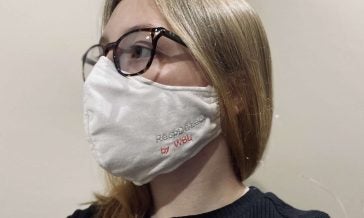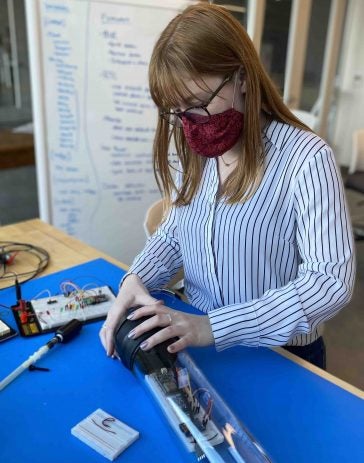
By Neil Nachbar
You could say engineering is in Michaela Bellisle’s genes. After all, her grandfather was an electrical engineer, her father is a civil engineer and her sister is a biomedical engineer.
“My parents always joked that I had an engineer’s brain when I was a kid because I would take apart my toys, and my sister’s toys, to figure out how they worked,” said Bellisle, who is earning her bachelor’s degree from the University of Rhode Island in electrical engineering this spring.
Bellisle made the most of her time at URI. She gained valuable hands-on research experience in one of URI’s biomedical engineering labs, embraced a student leadership role from working on her senior design project, and completed an internship that resulted in a full-time position upon graduation.

The Exeter native was able to satisfy her curiosity for how things work when she received a Science and Engineering Fellowship in her sophomore year. The fellowship placed Bellisle in URI’s Wearable Biosensing Laboratory, under the tutelage of Associate Professor Kunal Mankodiya.
“My first project was evaluating the performance of different electronic textile materials used in pressure sensors,” said Bellisle. “The research has since been used to determine the best materials for several other projects.”
Bellisle’s experience in Mankodiya’s lab was so positive, she continued to work in his lab for several more semesters.

“Michaela quickly grasped research skills in circuit design, embedded system programming and smart textiles,” said Mankodiya. “She’s a strong team player who goes above and beyond to ensure the quality and accuracy in her work.”
Most recently, Bellisle helped design a printed circuit board for the e-textile respiratory sensing system for neonatal intensive care unit monitoring.
“This project is aimed at developing a non-obtrusive respiratory monitoring system that is made of smart textile pressure sensors that are soft and comfortable to the fragile skin of preterm babies,” explained Bellisle.
Applying the research skills she developed in the Wearable Biosensing Lab, Bellisle created a vacuum, temperature and humidity monitoring system with two other students for her electrical engineering senior design project.
The system, which mounts inside a pressure tolerant enclosure, was presented as a challenge by Seascan Inc., a company that manufactures oceanographic instrumentation and equipment to be used primarily in scientific research and development.
“I have mainly worked on developing the firmware for the project, along with some initial electronic prototyping,” said Bellisle. “I also took on some of the leadership responsibilities to ensure our team’s success.”
Because of her leadership skills, she was asked to serve as a student coordinator in the College of Engineering this year.
“One of my main responsibilities was acting as a liaison between the student organizations and the dean’s office,” said Bellisle. “I worked closely with E-council to connect with the engineering student organizations and ensure that they had the support they needed when transitioning to a virtual setting.”
Bellisle, like her peers, adapted to remote learning in the last year. Her communication with Seascan, a Massachusetts-based company, was mostly conducted over Zoom. However, Bellisle did get to do an in-person internship this year at Bay Computer Associates in Cranston.
Bellisle was tasked with developing an automatic wire feeder using stepper motors.
“Much of the project involved learning a significant amount of programming because I had to write the firmware for the system,” said Bellisle. “I also assisted engineers on other projects, including product testing and a lot of soldering.”
Bay Computer Associates were so impressed with Bellisle’s work and initiative that they offered her a job upon graduation, which she gladly accepted.
“I’m very excited to start working full-time,” said Bellisle. “The company encourages its employees to expand their engineering knowledge. I would like to attend graduate school part-time by pursuing a master’s degree in electrical engineering, with a focus on embedded systems.”
Bellisle becomes the latest person in her family to graduate from URI with an engineering degree, following her father Matthew and sister Rachel.
“I may have followed in my family members’ footsteps, but I was able to create my own path and experiences in college,” said Bellisle.
